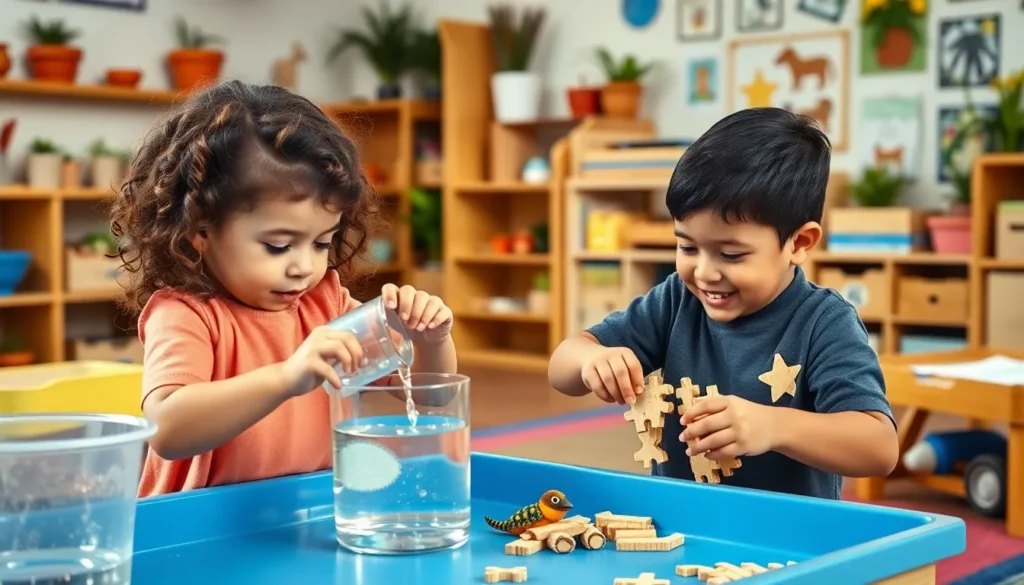Table of Contents
ToggleIn a world where traditional teaching methods sometimes feel like trying to teach a cat to fetch, Montessori lesson plans offer a refreshing alternative. They’re designed to ignite curiosity and foster independence, turning the classroom into a vibrant playground of learning. Imagine a place where kids learn at their own pace, exploring topics that truly fascinate them—sounds like a dream, right?
Overview of Montessori Lesson Plans
Montessori lesson plans emphasize hands-on learning and active engagement. Each plan incorporates materials that facilitate exploration, allowing children to interact directly with concepts. Lessons align with individual interests and developmental stages, encouraging children to work at their own pace.
These plans typically include practical life activities, sensorial experiences, language development, mathematics, and cultural studies. Practical life activities refine children’s fine motor skills and foster independence. Sensorial experiences involve materials that heighten awareness of the environment, supporting sensory development.
Language development lessons introduce vocabulary and phonetic awareness through engaging activities. These activities may include storytelling, word games, or letter sound exploration. Mathematics lessons utilize concrete materials to illustrate abstract concepts, promoting understanding through manipulation and discovery.
Cultural studies expand children’s awareness of the world. Activities might include geography, history, and science, emphasizing multiculturalism and global perspectives. Incorporating these subjects enables children to cultivate curiosity and a deeper appreciation for diversity.
Montessori lesson plans vary in structure but maintain consistency in their learner-centered approach. Carefully crafted activities invite collaboration and exploration, reinforcing social skills and teamwork. Assessment occurs through observation, which highlights each child’s progress and unique learning journey.
Flexibility in lesson planning allows educators to adapt activities based on children’s responses. Materials can be altered or introduced to meet the evolving interests and needs of the classroom. Ultimately, these plans create an enriching learning environment that nurtures lifelong learners.
Key Principles of Montessori Education

Montessori education centers around key principles that foster holistic development. These principles emphasize the importance of child autonomy and collaborative environments.
Child-Led Learning
Child-led learning forms the core of Montessori education. Learners choose activities that spark their interest, allowing for self-directed exploration. This approach encourages critical thinking, as children engage with materials at their own pace. Observers note connections between activities and individual growth. Educators support this freedom by providing a rich array of resources tailored to diverse interests and developmental stages. Flexibility in lesson planning becomes vital, as teachers adjust to the evolving needs of each child. Overall, this principle cultivates independence and boosts students’ confidence.
Mixed-Age Classrooms
Mixed-age classrooms foster collaborative learning and peer interactions. Learning alongside peers of varying ages enhances social skills, as older children often mentor younger ones. This setup promotes a sense of community and belonging, where children learn from each other. Diverse perspectives enrich discussions and deepen understanding. Teachers encourage children to explore at their own pace, making connections that transcend age boundaries. An adaptable learning environment allows students to tackle challenges with support from their peers. Ultimately, mixed-age classrooms create dynamic learning experiences that reflect real-world interactions.
Components of Effective Montessori Lesson Plans
Effective Montessori lesson plans incorporate several key elements tailored to foster student engagement and promote hands-on learning. These components ensure that educational experiences align with children’s developmental stages.
Learning Objectives
Clear learning objectives guide lesson planning, ensuring that each activity targets specific skills or concepts. Objectives should reflect developmental milestones relevant to the child’s age group. Teachers may include objectives like enhancing fine motor skills through practical life activities or fostering language development via storytelling. Each plan benefits from focused goals, providing clarity on what students should achieve by the end of the lesson.
Materials and Resources
Selecting appropriate materials and resources is crucial for effective Montessori lesson plans. Hands-on materials should stimulate exploration and promote independent learning. Common resources include sensory bins filled with various textures or math manipulatives that support concrete understanding. Additionally, utilizing culturally diverse books encourages discussions on social awareness and inclusivity. By prioritizing engaging materials, educators empower students to navigate their learning journeys confidently.
Creating Montessori Lesson Plans
Creating Montessori lesson plans involves thoughtful integration of the key principles of Montessori education. Educators design these plans to ignite curiosity while ensuring a comprehensive learning experience.
Steps to Develop a Plan
Identify clear learning objectives that align with each child’s developmental stage. Select materials that promote hands-on exploration and independent learning. Begin by brainstorming activities catering to various interests. Observe students to gauge their engagement and understanding. Each step builds toward a tailored learning experience that nurtures autonomy. Incorporate reflection to assess effectiveness and adapt future plans accordingly.
Adapting Plans for Different Age Groups
Consider the varying developmental needs of children when adapting lesson plans. Younger children benefit from concrete, sensory-based activities that introduce foundational concepts. Older children thrive on more complex challenges that encourage critical thinking and collaboration. Recognizing these differences ensures lessons remain relevant and engaging. Utilize mixed-age groupings to provide peer mentoring opportunities. This approach fosters a community learning environment that enriches the educational experience for all ages.
Benefits of Montessori Lesson Plans
Montessori lesson plans offer numerous advantages for children’s learning experiences. They foster independence by allowing children to choose activities that align with their interests. Hands-on learning becomes a primary focus, enabling students to engage with materials that enhance understanding. Active exploration promotes retention and encourages curiosity, vital aspects of effective education.
Practical life activities play a significant role in developing fine motor skills and self-care abilities. Sensorial experiences enhance sensory growth, supporting cognitive development. Language activities introduce vocabulary through storytelling and games, crucial for language acquisition. Mathematics lessons utilize concrete materials to clarify abstract concepts, making learning accessible.
Collaborative environments are also a foundational aspect of Montessori education. Students work together, enhancing social interaction and communication skills. Mixed-age classrooms contribute to this dynamic, allowing older children to mentor younger peers. This mentoring process promotes community and belonging within the classroom.
Observation is the key to assessing individual progress in Montessori settings. Educators can tailor their instruction based on each child’s unique learning journey. This personalization strengthens the learner-centered approach, ensuring that activities remain relevant and engaging.
Flexibility in lesson planning is essential as well. Educators adapt activities according to student responses, leading to an enriching learning environment. By prioritizing engaging materials, Montessori lesson plans empower students to take ownership of their educational journeys. Insights from assessment guide future planning, enhancing the overall effectiveness of teaching practices.
Overall, the comprehensive nature of Montessori lesson plans supports holistic development. They equip students with essential life skills, foster a love for learning, and create an inclusive atmosphere that values each child’s contributions and needs.
Montessori lesson plans offer a transformative approach to education that prioritizes the individual needs of each child. By fostering independence and encouraging exploration, these plans create an engaging environment where students thrive. The emphasis on hands-on learning and collaboration not only enhances academic skills but also nurtures social development.
Educators can adapt these plans to cater to diverse learning styles and age groups, ensuring that every child feels valued and supported. The use of observation for assessment allows for a tailored educational experience that promotes lifelong learning. Ultimately, Montessori lesson plans cultivate a love for learning while preparing children for future challenges in a dynamic world.





